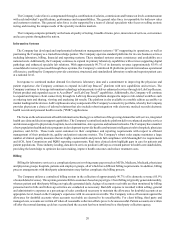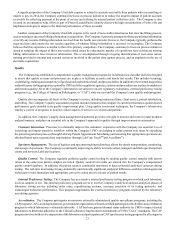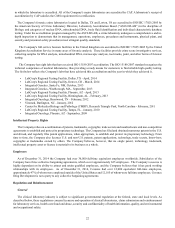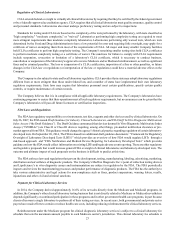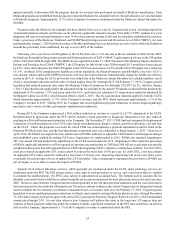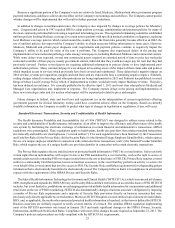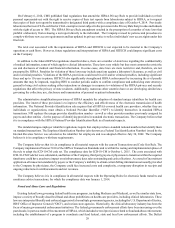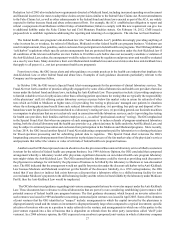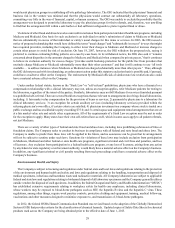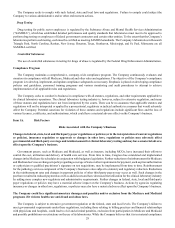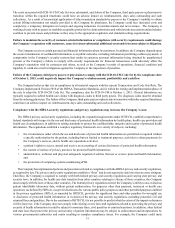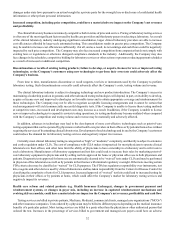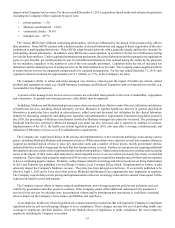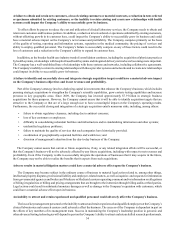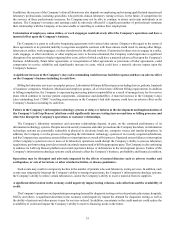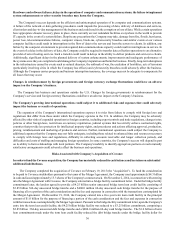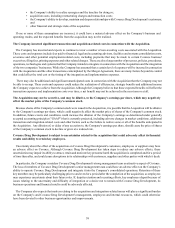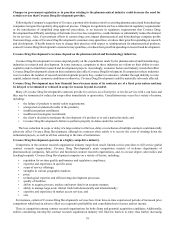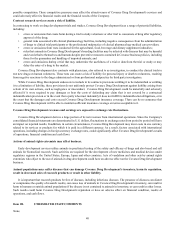LabCorp 2014 Annual Report Download - page 32
Download and view the complete annual report
Please find page 32 of the 2014 LabCorp annual report below. You can navigate through the pages in the report by either clicking on the pages listed below, or by using the keyword search tool below to find specific information within the annual report.30
with all statutory and regulatory requirements, there is a risk that government authorities might take a contrary position. Such
occurrences, regardless of their outcome, could damage the Company’s reputation and adversely affect important business
relationships it has with third parties.
The Company’s business could be harmed from the loss or suspension of a license or imposition of a fine or penalties under,
or future changes in, or interpretations of, the law or regulations of the Clinical Laboratory Improvement Act of 1967, and
the Clinical Laboratory Improvement Amendments of 1988, the FDA or those of Medicare, Medicaid or other federal, state
or local agencies.
The clinical laboratory testing industry is subject to extensive regulation, and many of these statutes and regulations have not
been interpreted by the courts. CLIA extends federal oversight to virtually all clinical laboratories by requiring that they be certified
by the federal government or by a federally-approved accreditation agency. The sanction for failure to comply with CLIA
requirements may be suspension, revocation or limitation of a laboratory’s CLIA certificate, which is necessary to conduct business,
as well as significant fines and/or criminal penalties. In addition, the Company is subject to regulation under state law. State laws
may require that laboratories and/or laboratory personnel meet certain qualifications, specify certain quality controls or require
maintenance of certain records. The FDA regulates diagnostic products and periodically inspects and reviews their manufacturing
processes and product performance. The Company's MedTox Diagnostic Inc.'s point of collection testing devices are subject to
regulation by the FDA.
Applicable statutes and regulations could be interpreted or applied by a prosecutorial, regulatory or judicial authority in a
manner that would adversely affect the Company's business. Potential sanctions for violation of these statutes and regulations
include significant fines and the suspension or loss of various licenses, certificates and authorizations, or product suspensions or
recalls which could have a material adverse effect on the Company’s business. In addition, compliance with future legislation
could impose additional requirements on the Company which may be costly, including FDA regulation of laboratory developed
tests.
Failure to comply with environmental, health and safety laws and regulations, including the federal Occupational Safety
and Health Administration Act and the Needlestick Safety and Prevention Act, could result in fines and penalties and loss
of licensure, and have a material adverse effect upon the Company’s business.
The Company is subject to licensing and regulation under federal, state and local laws and regulations relating to the protection
of the environment and human health and safety, including laws and regulations relating to the handling, transportation and disposal
of medical specimens, infectious and hazardous waste and radioactive materials, as well as regulations relating to the safety and
health of laboratory employees. All of the Company’s laboratories are subject to applicable federal and state laws and regulations
relating to biohazard disposal of all laboratory specimens, and they utilize outside vendors for disposal of such specimens. In
addition, the federal Occupational Safety and Health Administration has established extensive requirements relating to workplace
safety for health care employers, including clinical laboratories, whose workers may be exposed to blood-borne pathogens such
as HIV and the hepatitis B virus. These requirements, among other things, require work practice controls, protective clothing and
equipment, training, medical follow-up, vaccinations and other measures designed to minimize exposure to, and transmission of,
blood-borne pathogens. In addition, the Needlestick Safety and Prevention Act requires, among other things, that the Company
include in its safety programs the evaluation and use of engineering controls such as safety needles if found to be effective at
reducing the risk of needlestick injuries in the workplace.
Failure to comply with federal, state and local laws and regulations could subject the Company to denial of the right to conduct
business, fines, criminal penalties and/or other enforcement actions which would have a material adverse effect on its business.
In addition, compliance with future legislation could impose additional requirements on the Company which may be costly.
Regulations requiring the use of “standard transactions” for health care services issued under HIPAA may negatively
impact the Company’s profitability and cash flows.
Pursuant to HIPAA, the Secretary of HHS has issued regulations designed to improve the efficiency and effectiveness of the
health care system by facilitating the electronic exchange of information in certain financial and administrative transactions while
protecting the privacy and security of the information exchanged.
The HIPAA transaction standards are complex, and subject to differences in interpretation by payers. For instance, some payers
may interpret the standards to require the Company to provide certain types of information, including demographic information
not usually provided to the Company by physicians. In addition, new requirements for additional standard transactions, such as
claims attachments, and the ICD-10-CM Code Set, could prove technically difficult, time-consuming or expensive to implement.


